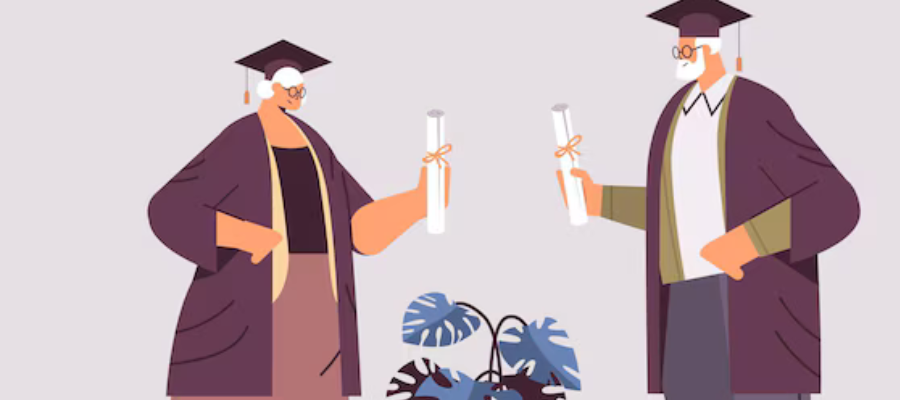Navigating PhD Applications as a Mature Student


A PhD is a bold, life-altering step—a step that requires intellectual commitment, emotional resilience, and personal sacrifice. For mature students—typically those applying after many years of work experience or a long lay-off from study—the road to doctorate-level study is both beset with unique challenges and blessed with unique advantages. If you are thinking of doing a PhD later in life, you are not alone—and you are far from too old.
This blog is a full guide to approaching the PhD application process as a mature student, from understanding your motivation to writing a quality proposal and thriving in academia.
1. Know Your Motivation: Why Now?
Before jumping into applications, take a moment to reflect on your “why.” This is not just a question for admissions committees, but you must know it yourself. PhDs are both a marathon and a sprint, and typically take 3–6 years to complete. Mature students succeed when they have well-defined goals such as:
- Moving into academic or research roles
- Achieving subject-matter proficiency
- Creating original research in a topic that they are passionate about
- Enhancing their career trajectory with a terminal degree
Feeling clear about your motivation helps to shape your proposal, SOP (Statement of Purpose), and interviews. Besides, once you know why you are doing it, you will be more likely to stick with it when there are barriers.
2. Take Ownership of Your Experience—It's a Strength, Not a Weakness
One of the most powerful tools mature PhD applicants bring to the table is real-world experience. Whether you’ve been in industry, raising a family, running a business, or exploring multiple fields, your life outside of academia adds depth to your application.
Admissions committees increasingly value maturity, perspective, and leadership qualities that younger students may not yet have developed. Here’s how to frame your experience effectively:
- Highlights leadership roles you’ve held, and how these are relevant to your planned research.
- Makes connections between your professional life and the areas of knowledge you want to cover.
- Shows soft skills like time management, planning projects, and communication—all crucial for PhD success.
Your professional experience, defined well, can turn you into a highly coveted candidate.
3. Choose the Right Program and Supervisor
Selecting the right PhD program isn’t all about ranking—it’s about congruence. As a mature student, your time is more valuable, so look for programs that more closely match your individual, academic, and practical needs.
Take these into consideration:
- Research focus: Is the program allowing you to explore the questions you’re most interested with?
- Supervisor compatibility: Find a supervisor who values your experience and supports your goals. Read their papers, understand their research interests, and reach out in advance to build rapport.
- Funding availability: Many mature students have families or financial responsibilities. Choose programs that offer fellowships, grants, or stipends.
- Flexibility: Some universities offer part-time PhDs or distance-learning models, which can be beneficial if you’re balancing other life commitments.
Do not hesitate to send an email to potential supervisors with a short introduction, your research interests, and why you would prefer to work with them. Having this relationship in place early can either make or break your application.
4. Prepare a Strong Application Package
The PhD application will typically include your academic transcript, CV, letters of recommendation, research proposal, and personal statement. All aspects must show your readiness and capability for doctoral work.
Statement of Purpose (SOP)
Your SOP must be a compelling narrative of your academic background, your research interests, and your career ambitions. In the case of mature students, it is essential to account for gaps or non-conventional routes confidently and affirmatively.
Be honest about why you’re pursuing a PhD now, and how your experience enriches your perspective.
Research Proposal
This is often the heart of your application. Make sure it:
- Clearly defines the research problem
- Demonstrates awareness of existing literature
- Outlines a realistic methodology
- Indicates the potential impact of your work
If you’ve done prior research, published papers, or completed any related projects, reference them. If not, showcase your critical thinking and originality.
Letters of Recommendation
If you’ve been out of school for a while, you might not have current professors with which to ask for a reference. That’s okay. Choose working contacts who can speak to your ability, integrity, and proficiency at handling long-term projects—especially research and writing-related projects.
5. Address Gaps or Concerns Head-On
It’s natural that older students would worry about how their age or education gaps will be perceived. Best course of action? Address them head-on and factually in your SOP or interview.
Example:
- If you’ve worked in a corporate professional career, highlight how it developed your analytical and leadership skills.
- If you went out on parenting or caregiving leave, talk about the resilience and time management that went into it.
- If you had a poor undergraduate record but excelled in a recent master’s degree or certification, emphasize your improvement and current academic ability.
Don’t apologize for your path—celebrate it. Your personal story adds depth to the scholarly environment.
6. Get Ready for the Lifestyle Transition
PhD life is demanding, and it’s not just writing and research. It normally consists of coursework, teaching, publishing, and conferences. As a mature student, you carry the extra weight of balancing these alongside family, work commitments, or poor health.
Tips to succeed:
- Organise your time carefully. Use digital calendars or project management programs to keep on top of things.
- Tell your supervisor how you are available and what you need.
- Build a support network—join study groups, online forums, or local meetups with other PhD students.
- Protect your mental health. Burnout is real, so take regular breaks and don’t hesitate to seek counseling or university support services.
Remember, you’re not alone. Many mature students find that their self-discipline, motivation, and focus give them an edge over traditional students.
7. Know That It’s Never Too Late
Whether you’re in your 30s, 40s, 50s, or beyond—there’s no deadline on intellectual curiosity. Universities around the world have welcomed PhD students well into their retirement years. Your age may bring with it limitations, but it also brings wisdom, perspective, and resilience.
So long as you remain dedicated and on track with your goals, the journey will be well worth it. Whether you use the PhD to shift careers, enter academia, or in order to further explore a field close and precious to your heart, you’re building a legacy of a lifetime of intellect.
Adult PhD applicants feel like they are impostors or are uncertain in younger researcher-controlled settings. Maturity is not a weakness—it’s your strength.
You arrive with increased depth, street-level applicability, and intentionality. With solid planning, sound brain, and sound guidance, you can not only survive the PhD process—you can thrive in it.
Hence, if you’re standing at the threshold of this new great scholarly leap, take the faith leap. Your experience isn’t beside the point; it’s your foundation.
Contact Aara Consultancy for more information!
We provide 360° Solution for your Education Needs. Contact us






